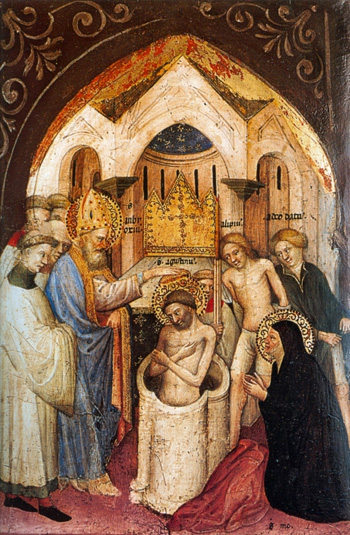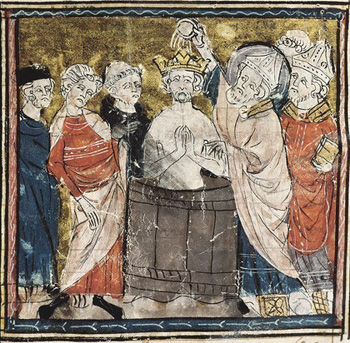About the Church
 |
 |
 |
 |
 |
 |
 |
The Sacrament of Baptism - II
Fundaments in Sacred Scripture & Magisterium
We can find abundant references both to the necessity of Baptism as well as to its sacredness in Sacred Scripture (1) and in the Magisterium.
In the New Testament, for example, we find these references to the Sacrament:
Continued

In the New Testament, for example, we find these references to the Sacrament:
- In Mk 1: 8, St. John the Baptist makes reference to Christ as the one who "shall baptize you with the Holy Ghost";
- In Mk 16:16 Our Lord categorically defines the need for Baptism for salvation when He says: "He that believeth and is baptized, shall be saved: but he that believeth not shall be condemned";
- In Jn 3: 5: Our Lord says to Nicodemus: "Amen, amen I say to thee, unless a man be born again of water and the Holy Ghost, he cannot enter into the kingdom of God";
- In Jn 3: 22 we read that: "After these things Jesus and his disciples came into the land of Judea: and there He abode with them, and baptized," even though He could have done it through His disciples (2);
- In Mt. 3:13 Christ himself gives the example of Baptism although here are three important points to remember:
- Christ did not need baptism: St. Ambrose gives a clear explanation when he says: "The Lord was baptized not to purify himself but to purify the waters, so that, purified by the flesh of Jesus Christ, that did not know sin, they had the strength to baptize others." (3) And although not all the waters have continuity with the Jordan, the virtue of Christ is transmitted to the other waters by the essential similarity of the element.
- Christ was baptized with the intention of instituting Baptism as a Sacrament and not simply as an example of humility or as an act limited only to His person. Baptism is, therefore, provided - by the Divine will - with real efficacy to correct what original sin had destroyed in the soul.
- Although some theologians disagree about the exact moment of the institution of Baptism (such as Alexander of Hales who thinks it was after the resurrection, or St. Bernard who thinks that it was when Christ spoke of himself to Nicodemus) the official doctrine of the Church as expressed in the aforementioned text of the Catechism of the Council of Trent is that it was instituted in the same Baptism of the Lord.

St. Ambrose baptizing St. Augustine
- Isaiah 52:13-15 says: “Behold my servant shall understand, he shall be exalted, and extolled, and shall be exceeding high. As many have been astonished at thee, so shall his visage be inglorious among men, and his form among the sons of men. He shall sprinkle many nations, kings shall shut their mouth at him: for they to whom it was not told of him, have seen: and they that heard not, have beheld.”
- Ezekiel 36:25 says: “And I will pour upon you clean water, and you shall be cleansed from all your filthiness, and I will cleanse you from all your idols.”
- In Zachariah 13: 1 we read: “In that day there shall be a fountain open to the house of David, and to the inhabitants of Jerusalem: for the washing of the sinner, and of the unclean woman.” (4)
- And in Romans 6: 3- 4 we can see an example of the practice of the Apostles: “Know you not that all we, who are baptized in Christ Jesus, are baptized in his death? For we are buried together with him by baptism into death; that as Christ is risen from the dead by the glory of the Father, so we also may walk in newness of life.”

St. Remigius baptizing Clovis
- The Council of Verona which defines with perpetual anathema those who "do not fear to believe or teach in other way than as the Holy Roman Church preaches and observes about (...) Baptism";
- The Lateran Council, which explains that every person - if he retains the form - can validly baptize;
- The Council of Lyon, that mentions Baptism as one of the seven Sacraments and, finally;
- The Council of Trent in its canons on baptism declare:
- 4.1. That water is necessary for Baptism.
- 4.2. That in the true doctrine of Baptism is given in the Roman Catholic Church.
- 4.3. That even the baptism conferred by heretics (with the intention of doing what the Catholic Church does) is valid.
- 4.4. That baptism is necessary for salvation.
- 4.5. That the baptized can lose grace because of sin (but not the character of the faith) (5).
- 4.6. That the baptized are obliged to obey the whole law of Christ.
- 4.7. That all the baptized (including heretics) are subject to the law of the Catholic Church.
- 4.8. That the vows made after Baptism do not diminish the faith or the same baptism.
- 4.9. That the sole remembrance and faith of Baptism neither forgive sins nor make them venial.
- 4.10. That Baptism should not be repeated in the case of person who apostatized from the Faith and then repented.
- 4.11. That it is not necessary to wait until reaching the age when Christ was baptized or at the point of death to receive Baptism.
- 4.12. That infants, even if they cannot profess faith, can be baptized and should not be re-baptized at the age of discretion.
- 4.13. That baptized infants should not be questioned when they reach the age of discretion.

The Council of Trent teaching on Baptism
Continued
- See also Lk. 3:16, Act. 11:16, Gal 3: 25-26.
- Jn 4: 1-2
- Saint Thomas Aquinas, Summa Theologiae, p. III. q. 39, a. 1: “Baptizatus est Dominus, non mundari volens, sed mundare aquas, ut, ablutae per carnem Christi, quae peccatum non cognovit, Baptismatis vim haberent, et ut sanctificatas relinqueret postmodum baptizandis.”
- Cf. v. 6: “And they shall say to him: What are these wounds in the midst of thy hands? And he shall say: With these I was wounded in the house of them that loved me.” A clear reference of the Passion of Christ.

Posted January 8, 2018















